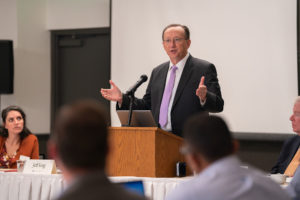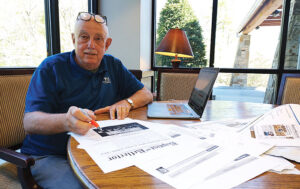
 Is it a spiritual discipline or a spontaneous response to a deepening relationship with God? And why are Baptists more known for their feasting than fasting?
Is it a spiritual discipline or a spontaneous response to a deepening relationship with God? And why are Baptists more known for their feasting than fasting?
Fasting: A Discipline?
Fasting is both an Old and New Testament teaching, mentioned more times in Scripture than baptism, says Don Whitney in Spiritual Disciplines for the Christian Life.
Whitney, spiritual formations professor at Midwestern Seminary, defines fasting as a "Christian's voluntary abstinence from food for spiritual purposes?' In order for God to bless a fast, it must be God-centered in its purpose and not "coerced ," he adds, calling fasting the "most feared and misunderstood of all the spiritual disciplines." As evidence, Whitney points to the lack of sermons addressing the subject. Yet, Whitney writes, Jesus "expects us to fast?"
"… In the strictest sense, Jesus did not command fasting ," said Richard Foster in The Celebration of Discipline."But it is obvious that he proceeded on the principle that the children of the kingdom of God would fast?"
Both authors discuss Jesus' teaching in Matt. 6 to not give, fast or pray so that others will see and self will be glorified. "There's always those who are afraid to talk about [fasting], because it takes the glory away …, but you know, we pray silently and in secret and we talk about prayer," says Alvin Reid, associate professor of evangelism and church growth at Southeastern Seminary.
The dangers of legalism don't justify silence, adds Reid, who says he never heard about fasting until he went to college and met a man who fasted. Since then, it has been something he does when he is about to make a big decision, or desires to take a personal spiritual inventory or retreat alone with God. Although not opposed to lengthy fasts, Reid typically fasts for only one day at a time for "deep and concerted" prayer.
However, fasting for 40 days, as did Moses, Elijah, and Jesus, is the current challenge in Bill Bright's book The Coming Revival. Bright, founder and president of Campus Crusade for Christ International, recounts his own 40-day fast, and says God has led him to pray that at least two million North Americans will fast and pray 40 days for an awakening in America and the fulfillment of the Great Commission.
Not wanting to be accused of "beating a fasting drum ," Bright says he's committed to the Great Commission, but is convinced that fasting and prayer by a large number of Christians will facilitate and accelerate evangelism and discipleship as well. Prominent Christian leaders joined Bright in December 1994 for "A Special Call to Prayer and Fasting for America?' Expecting about 300 participants, Bright wrote "God moved far beyond my expectations as more than 600 came to fast and pray."
Adrian Rogers, former SBC president, and Jim Henry, current SBC president, were among those in attendance at the Orlando prayer meeting. Rogers, in an introduction to Bright's book about the event, says, "For many, revival is a shopworn phrase, but Dr. Bright points out that by massive fasting, repentance, praying and obedience it can be a vital reality?"
Henry says he's familiar with churches that have prayed and fasted: "And I have seen God do some absolutely phenomenal things. I know that when we pray and fast, it gets the attention of heaven, and God moves in and with His people."
Fasting: A Spontaneous Response?
There are those who argue that fasting is misunderstood if it is employed in an attempt to get something from God. Henry Blackaby, author of Experiencing God and director of prayer and spiritual awakening at the HMB, warns that God is not obligated to respond when we do certain spiritual exercises.
"… I think that is heretical. God is God and we don't put God on the spot;' Blackaby says. He believes fasting is "… not a spiritual discipline but rather the spontaneous response of a life that is fully concentrated on the Lord and will not break for a meal." Jesus went without food when he was focused on his relationship with God to a degree that he could not break for a meal. This is different, according to Blackaby, than a person who exercises discipline in his life in hopes of producing a response from heaven.
"Fasting is a by-product of a relationship with God, rather than a means to a relationship with God ," Blackaby says. At the same time, he says he doesn't fault those who do fast for that reason. Admitting he would "hesitate" about enlisting others to fast for revival, nonetheless, Blackaby does not discount that revival could happen in that situation."If fasting produces a holiness and a deep commitment, and if a lot of the people fasting were led to repentance and the holiness of life reflects Blackaby, "that creates a highway for which God can go for revival?"
Scripturally, historically and personally, Blackaby defends his position, and equates it to prayer. "I don't have a quiet time in order to have a relationship with God I have a quiet time because I have a relationship with God. I pray, not because I believe in prayer, as much as I believe in the God who answers prayer," Blackaby asserts. He says people are often taught activity, but "you can teach people to pray (who will) have no heart relationship with God. A person who has a relationship to God — there's no way you can keep them from giving, prayer and fasting …."
Fasting: A Combination of Disciplined and Spontaneous Love
It's not inconsistent to acknowledge that fasting could be both a discipline and a spontaneous response to God's love, says Dallas Willard, philosophy professor at the University of Southern California. However he adds it is not necessarily both and cannot be both at the same time.
Willard, author of The Spirit of the Disciplines and an ordained Southern Baptist minister, says he believes there has been a lack of teaching about fasting in Baptist churches that is rooted in "anti-Catholicism" extremes. This reaction harks all the way back to Martin Luther's accusations against the Catholic church about the excesses of outward punishments against the flesh that had little regard for the "grace" teachings adhered to by Baptists, claims Willard. But, he adds, those teachings on "grace" have prompted some Baptists to sit in the pew and do little toward developing their faith, the very thing the disciplines are designed to aid.
Alvin Reid, at Southeastern Seminary, says Southern Baptists may have become too privatized and individualistic in their faith. "I do think revival and spiritual awakening is somewhat of a corrective of our theology and our … orthopraxy. There is a hunger to know God intimately," Reid says, adding he believes spiritual awakening is when God begins to move in different places and touches different areas and hearts in the same ways.
"I think these things are of God and God is moving in the hearts of His people," Reid sighs. "I'm encouraged, and I'm not so afraid of the wildfire that I want to miss the real fire."
Humility, Revival and Fasting: One Man's Journey
With a quiet but forceful voice, Ronnie Floyd, before a crowd of his peers, shared a "personal testimony" of God's movement in his life. Twenty-four pounds lighter than just a few months before, he explained he was not the victim of some terrible disease, but instead a man humbled by God after fasting for 40 days.
What had prompted him to drink only the juice of fruits and vegetables for such a long period of time? An answer to a call from God, said Floyd, pastor of Springdale Baptist Church and chairman of the SBC's Executive Committee."The Lord spoke to me and told me to pray and fast for 40 days for revival in America, my church and in my life?"
After sensing that call, Floyd walked into his office and found a copy of Bill Bright's new book, The Coming Revival. Left by a church member, Bright's book detailed his own call to fast and pray 40 days for revival, and his vision that two million Americans would join him.
Floyd saw confirmation of his own call in Bright's book. "I thought (a 40-day fast) was unusual. I thought it was extreme," said Floyd. "But honestly, it has been the clearest call in my life since my call to ministry. Because of that journey with God, my life will never be the same again?"
While fasting, Floyd said God answered his question: What is spiritual revival? "I believe today that spiritual revival is the manifested presence of God in your life. Revival is when the inner man can be opened up to God, when Jesus is free to be Himself within you," said Floyd.
"I believe with all my heart that God is going to bring a mighty spiritual revival before He comes again," said Floyd. "I believe it will transcend all denominational lines, all cultures, all ethnic groups, all races."
"It's far past time we repent of the arrogance we (Southern Baptists) have had for years," Floyd said. "God doesn't need the Southern Baptist Convention for revival." Gleaning from the book of Haggai, Floyd highlighted three specific Scriptural times leading to revival: a time of sin, a time for change and a time for revival. Quoting statistics on abortion and pornography and commenting about the conditions of our schools and churches, Floyd said the sin of self-indulgence is evident in America.
Self-indulgence is "nothing more than egotism. It is self-worship" warned Floyd. "God is not pleased where many of us are. When pride walks into our churches, God walks out?"
While fasting, Floyd said he read Isaiah 57:16, and "God annihilated my pride. God took me to the room and chastened me mightily."
"I believe God's greatest accomplishment in my life during this time with Him was the breaking of my selfish pride which, unknown to me, had bound me so often from the fullness of everything God wanted me to have in Him."
Floyd would agree prayer and fasting is a "lost art" in the life of 20th century believers. "Most believers do not even understand the principle, much less how to fulfill the practice. … We must obey God when He calls us to fast, whether it be one meal, one day, three or 14 days, or even a 40-day fast. We must obey God," said Floyd.
"I'm no longer going to worship the unholy trinity of baptisms, buildings, and budgets. It is possible God can bring a revival to a preacher. It has come to this one. We need to (begin) praying and fasting for spiritual revival."
"God is moving greatly in our days," Floyd said. "God asks, 'Will you pay the price?' It's time for revival …. It can happen. You need to let go, and let God do what He needs to do."
Compiled by Joni B. Hannigan from Ronnie Floyd's sermon at the 1995 Southern Baptist Pastor's Conference and an article in Springdale Baptist Church's magazine, Priority.
For further information
• The Coming Revival, Bill Bright, NewLife Publications, 1995
• Celebration of Discipline: The Path to Spiritual Growth, Richard J. Foster, Harper San Francisco, 1988
• Spiritual Disciplines for the Christian, Donald S. Whitney, Navpress, 1991
• The Spirit of the Disciplines, Dallas Willard, Harper & Row, 1988
• Experiencing God: Knowing and Doing The Will of God, Henry T. Blackaby & Claude V. King, LifeWay Press, 1990














